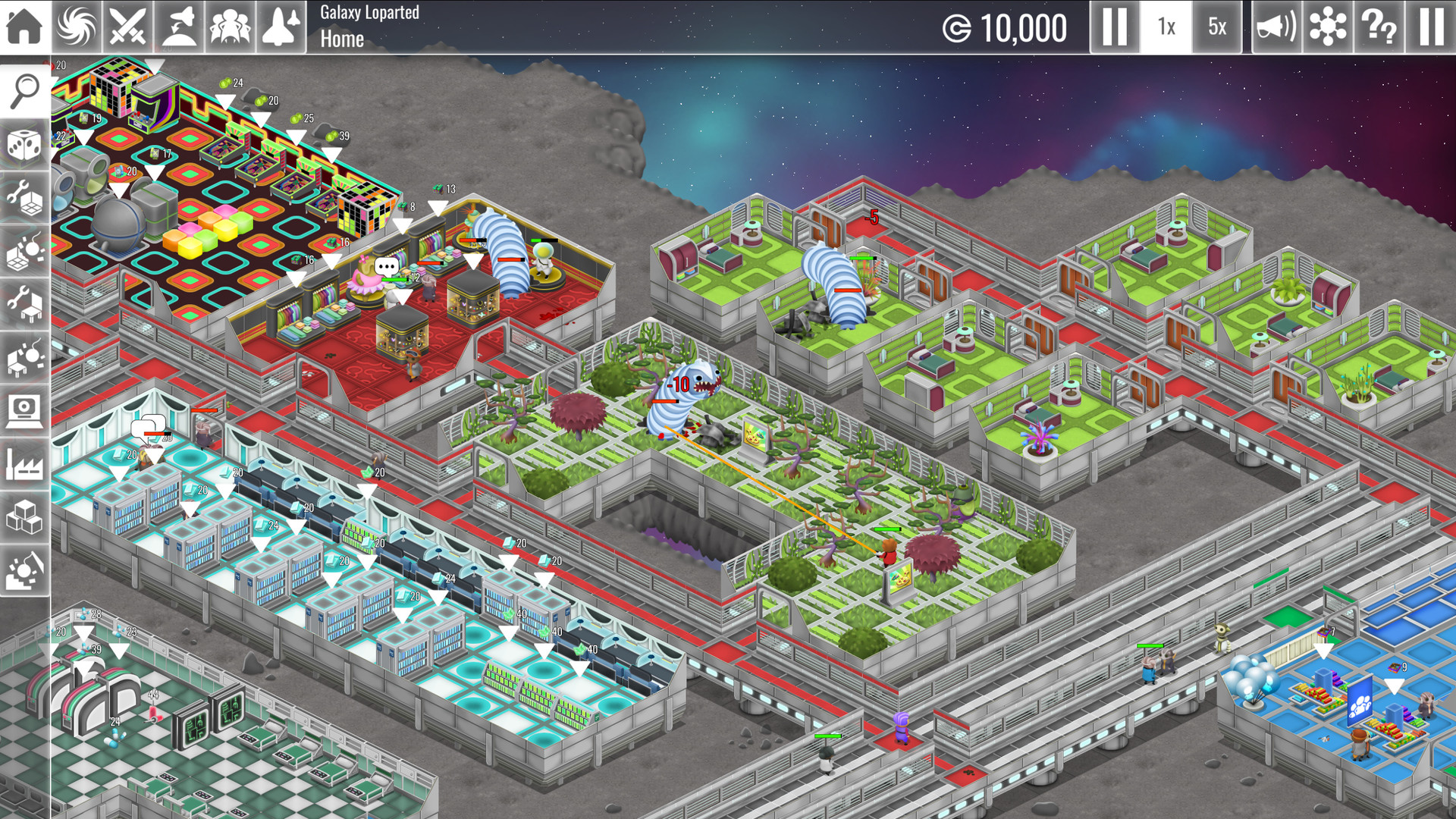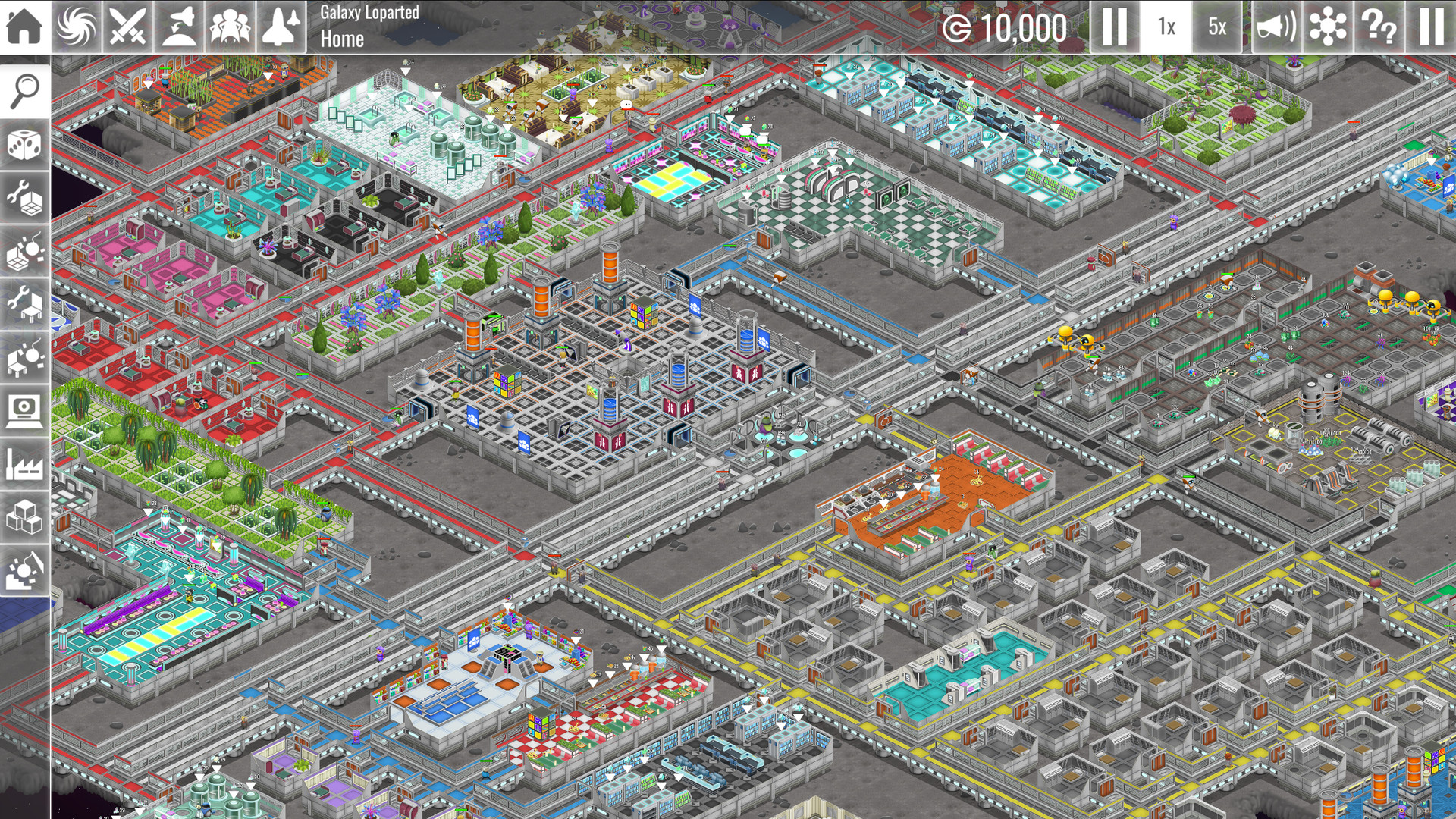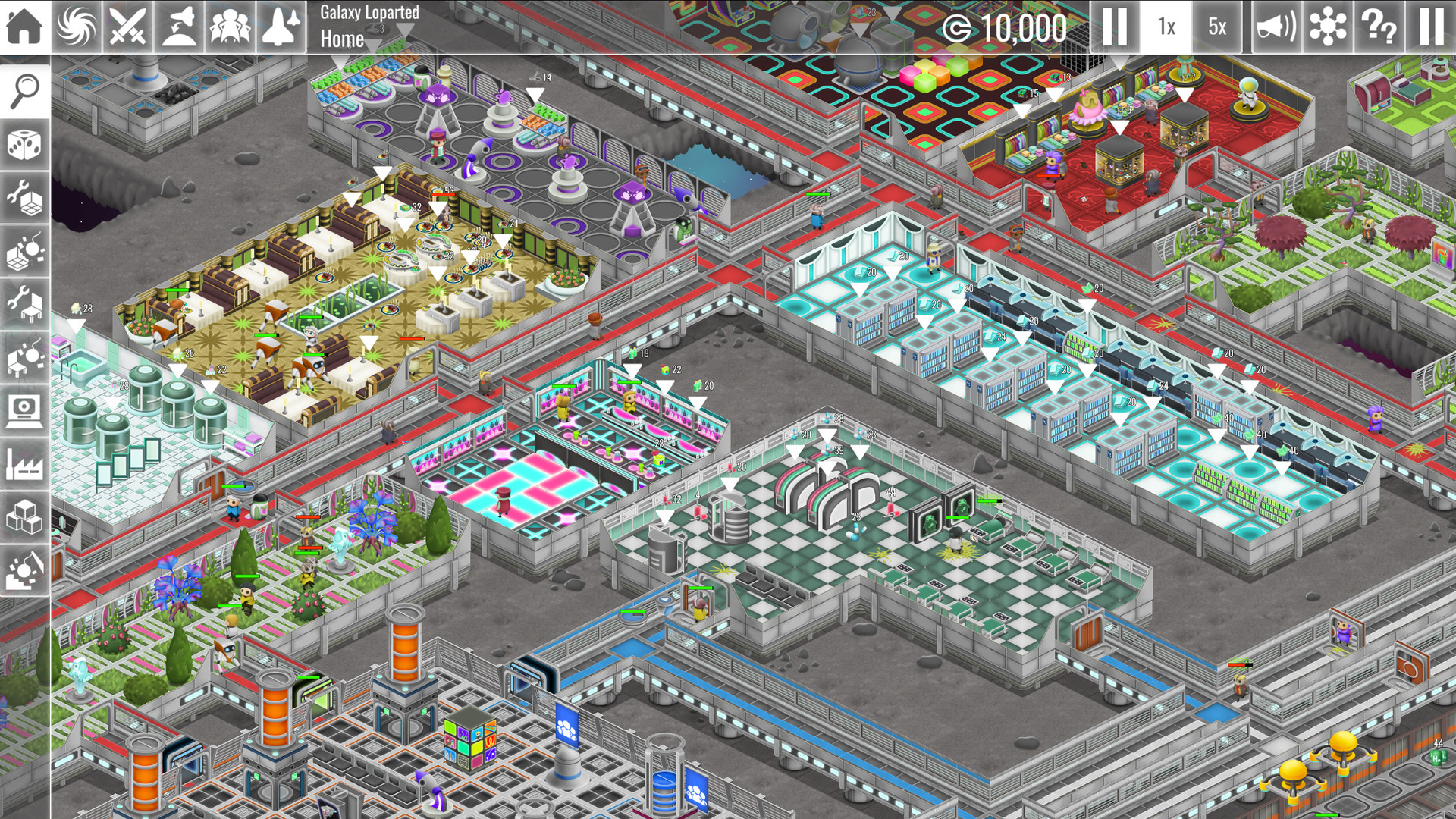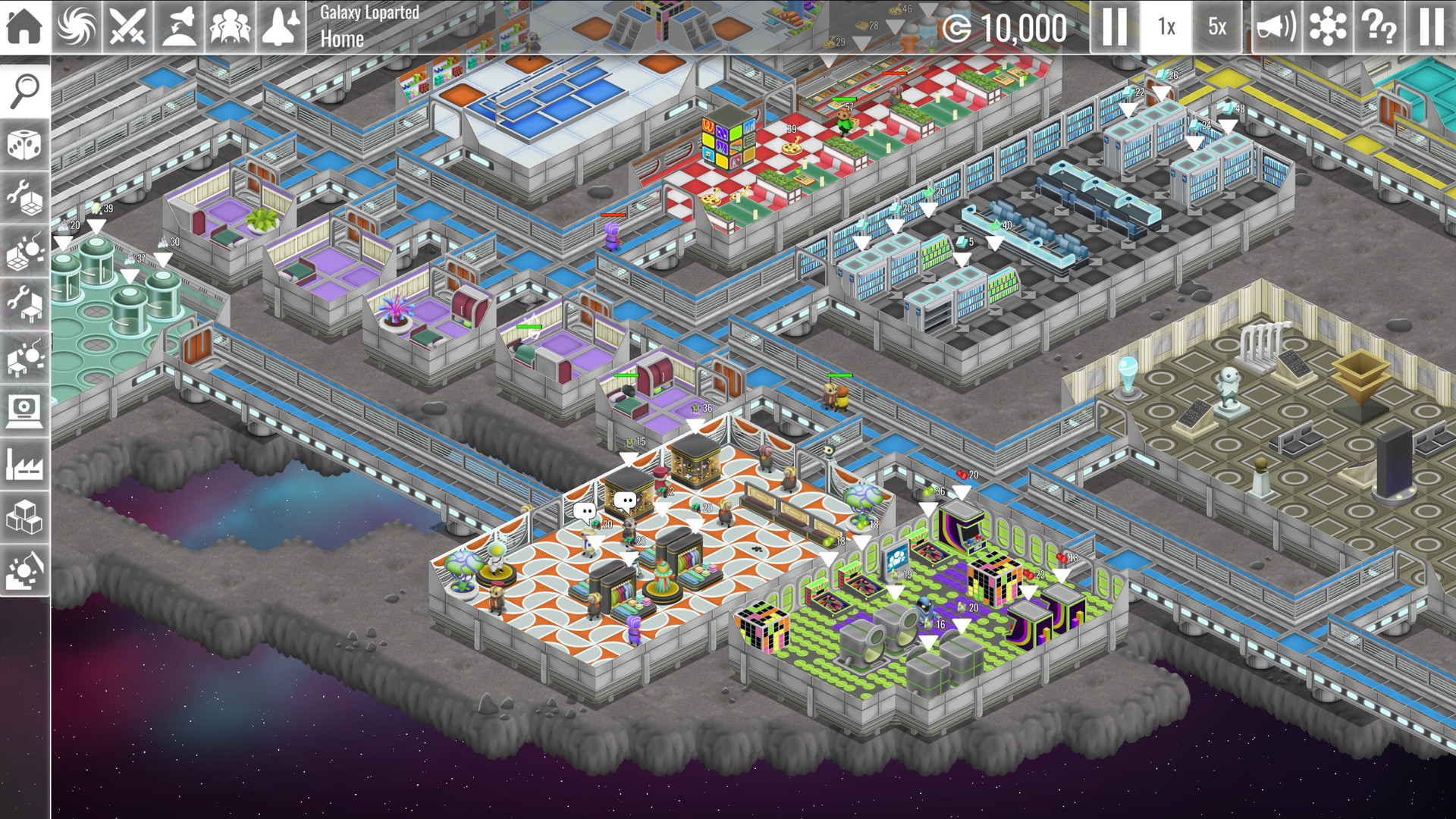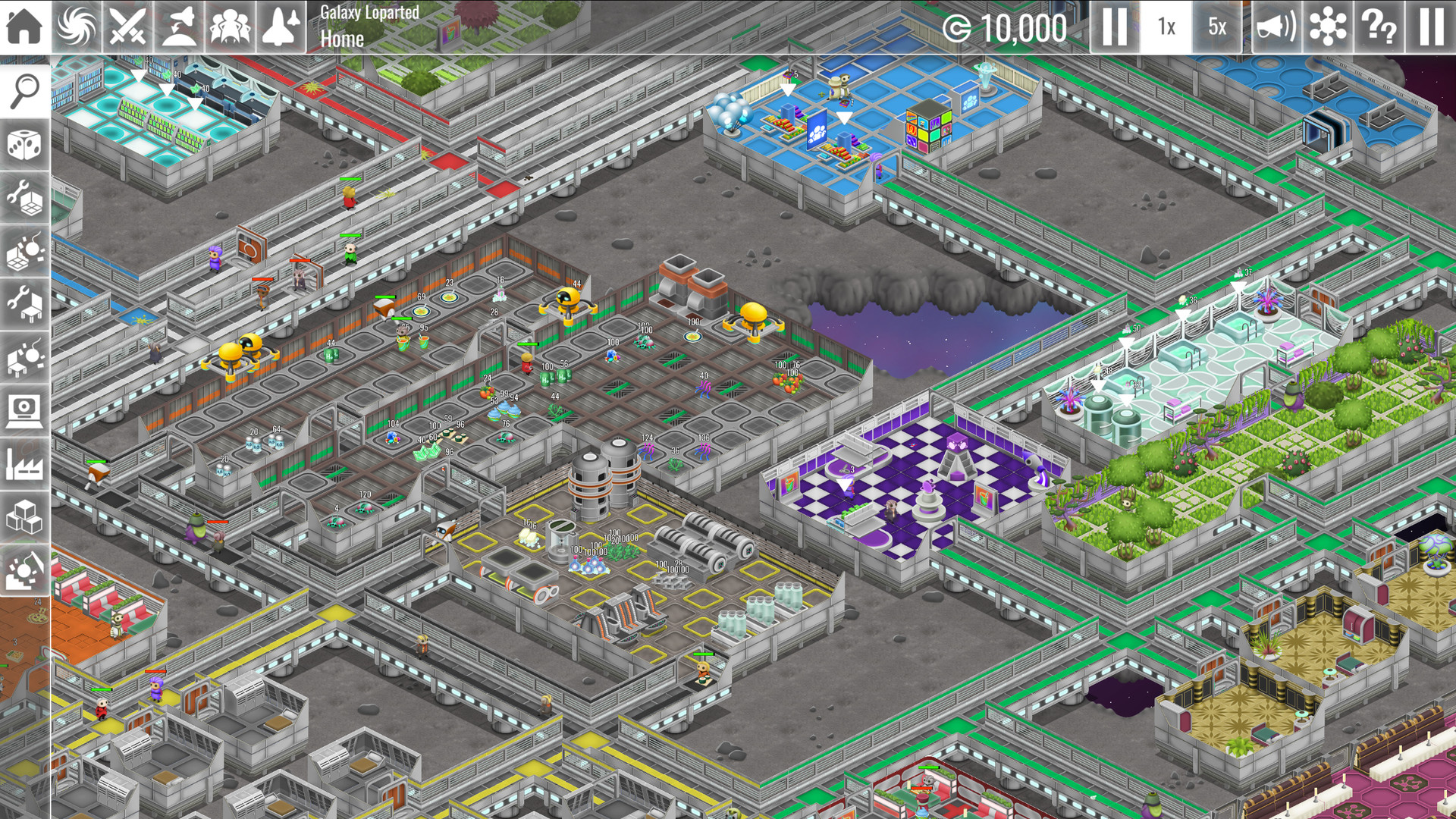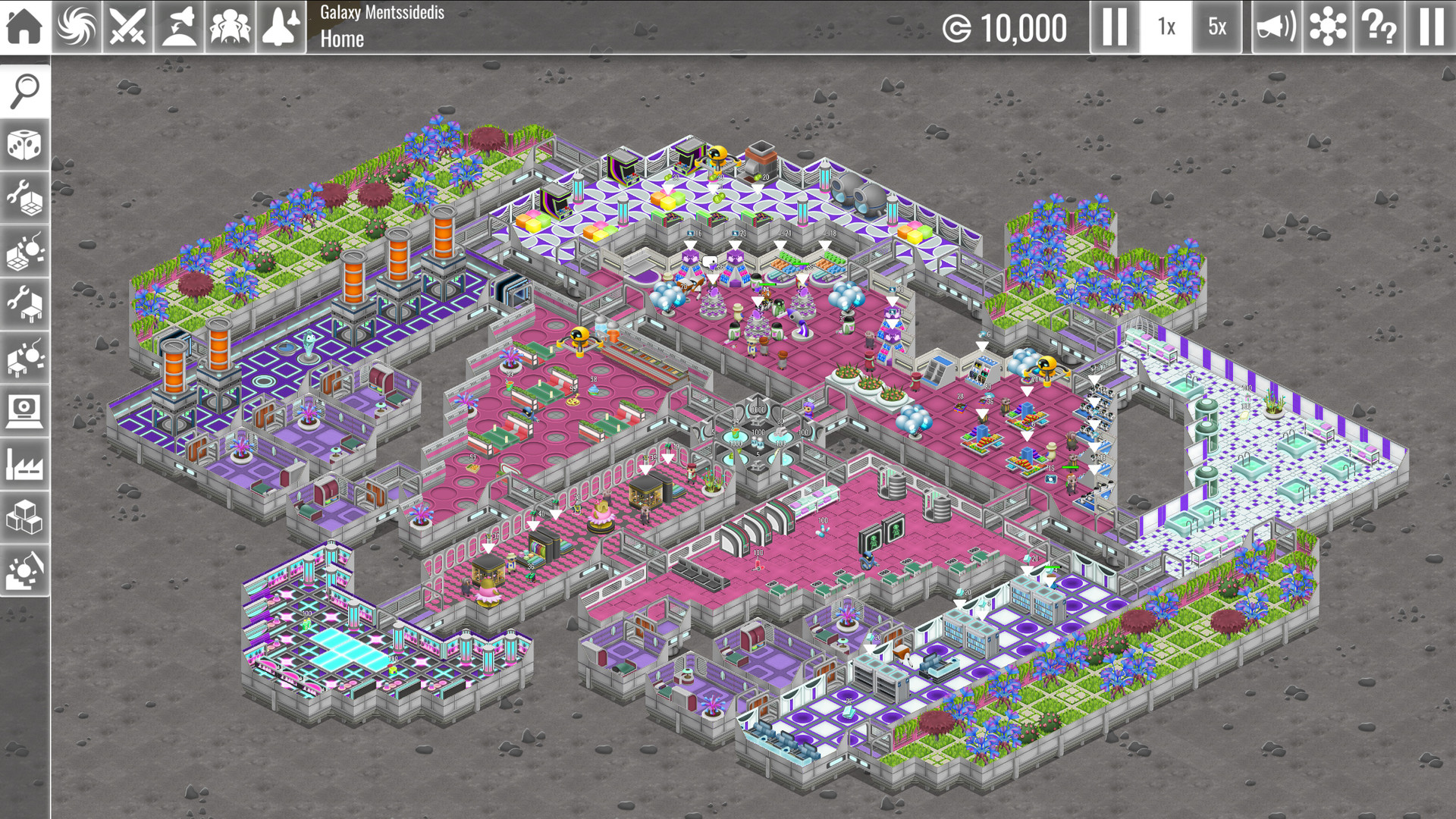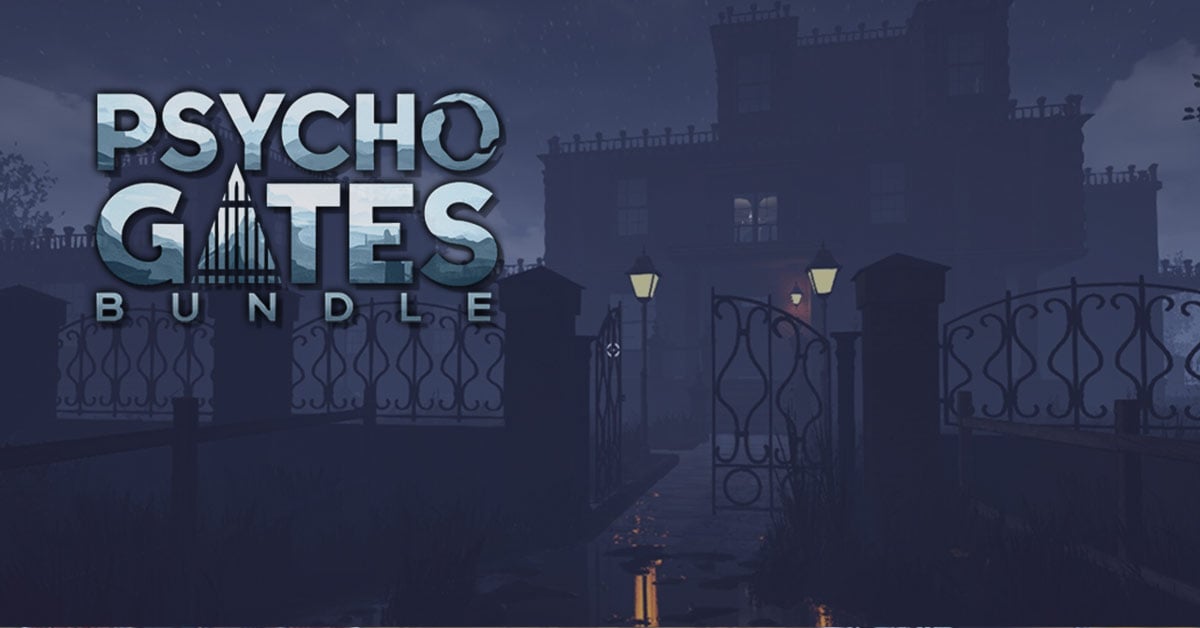
The Spatials are back on a new adventure!
The Spatials: Galactology is The Spatials reimagined as a deeper, more rewarding simulation game. With mod support and active pause, Galactology adds new items and structures to build, trade routes to exploit, planets with many new variables, sophisticated AI, civilizations that actually attack your station -- and unique gameplay systems behind every object and room.
Key Features
- Design a space station and watch your crew as they build it in real time
- More freedom for your designs: use any room with any objects, color the floor tiles as you wish
- Reinforce your space station with new buildings, management decisions, and staff
- Assemble robots to assist with station chores
- Explore a detailed simulation with many systems to play with -- including manufacturing, research, healthcare, disease, emotional breakdowns, combat, hunger, thirst, cleaning, decay, security, FIRE!, and more
- Handle complex logistics, requiring restocking and inventory control
- Earn in-game cash by growing your space station’s hospitality business
- Designate staff for your bar or your research lab
- Visitors and officers have a mind of their own. Make sure their needs are met!
- Build hospitals to care for the wounded and diseased
- Secure your station with cameras, scanners and turrets
- A randomly-generated galaxy with 100+ planets
- Build spaceships and explore the galaxy
- Explore the surface of planets and asteroids
- Engage in real-time combat to forge alliances and make new enemies
- Find natural resources, civilizations and ancient ruins
- Establish trade routes with your allies
- Develop and download gameplay mods from the Steam Workshop
- And more, much more is coming!
About Weird and Wry
Weird and Wry is a Barcelona game development studio founded in 2014 by two brothers: Carlos and Max Carrasco. Carlos (a programmer) and Max (an artist) share a love for simulation games and classic play -- which heavily influenced The Spatials, their first project. Inspired by the great classic sim games of the '90s, The Spatials combined classic base-building gameplay (based on isometric tile room building) with a real-time combat system and an exploration campaign. The Spatials was released on Steam in March 2015 and took off! Thanks to its success and growing fan base, The Spatials spawned a sequel -- The Spatials: Galactology, which updates the original concept with deeper gameplay and a whole new take on the space station management business.
Version 3.9 is now available!
Aesthetics refuses to die! I've spin again the idea, this time as a value that gets calculated for whole rooms, and displayed in the building overlay:

It's calculated from the contributions from the room flooring and its objects. Now that this is more visible officers will also require a minimum aesthetic value for their bedroom:

Notice something in the previous screenshot? Yep, graduates do not require a private room anymore. Instead they will just require a basic bed (which now can be made private to an officer) plus an aesthetic value for their bedroom (which is any room the bed is located at). Since basic beds do not assign ownership to their surroundings and can be built in multiples in the same room, this means graduates will happily sleep in barracks, as long as it's a nice barrack. This will solve the issue of having to build huge housing areas for your graduates, which could get quite tedious. Master officers will still demand a private room and will also ask for a high aesthetic value, along with all of their previous demands.
Resources that are imported into your station (basically all recipe ingredients) now have a configurable limit:

This means your ships will stop collecting Fruit when your station stock reaches 7500 (this default value is equivalent to 10 stacks). This will alleviate the issues with having to build too much storage areas, and it will be useful when the full import/export economy is in the game.
Have this super well equipped master level officer that was in the original 6 and you don't want to lose? There's an object for that now:

First you assign an officer to the clone chamber object (only one officer per chamber, as with any other object ownership association). If the officer dies they will immediately spawn inside the clone chamber, at full health, even if the officer was in a ship or exploring a planet. This will also destroy the clone chamber object, but such is the price of insurance. Speaking of prices, it's also very expensive. If you *really* like your officer you can assign them to any amount of insurance objects, giving them as many lives as your cash allows.
Raw resources are now limited to one per planet, and are strictly bound in level ranges:

In the same vein all recipes have been reviewed so early research recipes also consume low level resources, instead of the very mixed ingredients they had before.
The research tiers have also been reviewed and the required points have been increased, since the previous amount were too low (but aided in testing the game).
Raw resources are not free anymore. They now cost credits, and the station wallet will pay for them when one of your ships loads them from a planet. This is expressed from the point of view of the civs that allow you to extract raw resources from their planets, so it's called an export:

All raw resources have a fixed standard price, but the more a civ likes you, the cheaper they are willing to sell those resources to you. It can go from 100% of the price at neutral to just 10% of the price at the highest possible reputation level.
Your ships will automatically purchase the resource they load from the planets, as long as you have the money for it. Higher level resources can be quite expensive, specially when purchased from neutral civs. More care will be now required to set up routes, instead of the endless abundance of previous versions.
The export system was clear from early on, but the design ideas for the import were less clear. After some false starts 2 designs extremes were identified:
A) Import happens only to visitor ships (simplest). The player would only be able to sell its products to visiting ships from non-hostile civs. A simple interface would display those ships demands ("We want 10 rations, would you sell them to us?") and an accept/decline prompt.
B) All galaxy planets are available as import receivers and the user distributes to them using the autopilot. All planets in the galaxy have demands for one or more products, and the player can supply them to make money. This requires enhancing the autopilot to a full blown auto trading system. Each planet order would need to include the order kind (buy resources / sell products / load from home) plus the resource subject and amount. This would also require multiple items per order (think about a home visit, it's legitimate to want to load several different products plus unload the raw cargo), smart stocking choices (what happens if there's not enough station stock to satisfy the order? Wait for more production or leave with whatever is available? Then how must the products be distributed for the sell orders, given the defined amount won't be meet?). This is a very deep rabbit hole. The end result would be formidably complex too.
In the end an hybrid solution is being implemented, with some of the complexity of B but crucially removing the auto piloted auto trading aspect.

Unlike the civ exports tab, the import tab will be interactive. Just as with raw resources, civ planets will only crave a single product. Products are also strictly assigned to civs, so for example you'll only be making rations for the humans. First you select the resource you want to sell. Then a list of that civ planets that crave that resource will be displayed, along with a price. That price will reflect the internal demand of the planet, which will be based on a simulated value over time (and it will be disturbed in case you sell to them).
In the right side you'll be able to change the amount of that product you want to sell to that planet, and which ship you want to use to perform the delivery (from the ships currently parked at home). Then you can start the delivery and the ship receive an order to travel to the planet, sell the product and come back home (this will be internal code, not configurable as an autopilot).
The idea is to make this manual action easy enough to perform, but still have some strategy and consequences. You'll be affecting demand in the planet, at least for some time after the delivery, so you can't spam a single planet with your cheap rations. You'll need to have ready to go ships parked at home, and their cargo hold size will be of relevance. But also their speed, since the demand price changes over time. It's not as complex or as "real" as the B option, but it's not the trivial solution either.
The "Avg BOM" value deserves a mention. BOM is for Bill Of Materials. Since you are selling products whose raw ingredients you paid for, this is a very important number to keep in mind when deciding to sell something. You could be selling under cost! But calculating this is very complex, since you can be sourcing the same raw from different civs at the same time. The game will try to keep average purchase tallies from your planet extraction and use those numbers to calculate the products BOM, so you can compare them to the price offered by the simulated demand pricing. That pricing in turn will be based on the product BOM assuming a purely neutral civ, so with some patience it will be possible to score large profit margins in your sales.
As you can see I'm a logistics/systems geek, but I have to exercise some restrain to keep the game playable (and to release at some point before 2025 :)
- Optional exclusive fullscreen mode
- Inside the object tool alt click will now also copy the settings from the object, valid for objects that are rebuildable after destroy (factories and pallet-like objects)
- Better spawning areas for some non-violent events, including allowing to spawn inside the station. And better area selection for other events, still spawning at the border but now actively choosing a location close to inhabited areas.
- Shift click with the info tool now allows to add officers to the selection
- New officer sorting option: seniority. Sorts officers by how long they have been part of your staff.
- New officer sorting option: average item level. Sorts officers by their average equipped item level in increasing order.
The new station <--> civ commerce system is the big feature of this release. Cash becomes much more important with a limited amount to start with and the need produce and sell excess output from your factories to finance your station growth. Check the tutorial in the Civs screen for more details.
Here's the development notes for 3.9, in case you missed our updates.
Room-level aesthetics
Aesthetics refuses to die! I've spin again the idea, this time as a value that gets calculated for whole rooms, and displayed in the building overlay:

It's calculated from the contributions from the room flooring and its objects. Now that this is more visible officers will also require a minimum aesthetic value for their bedroom:

Notice something in the previous screenshot? Yep, graduates do not require a private room anymore. Instead they will just require a basic bed (which now can be made private to an officer) plus an aesthetic value for their bedroom (which is any room the bed is located at). Since basic beds do not assign ownership to their surroundings and can be built in multiples in the same room, this means graduates will happily sleep in barracks, as long as it's a nice barrack. This will solve the issue of having to build huge housing areas for your graduates, which could get quite tedious. Master officers will still demand a private room and will also ask for a high aesthetic value, along with all of their previous demands.
Import limits
Resources that are imported into your station (basically all recipe ingredients) now have a configurable limit:

This means your ships will stop collecting Fruit when your station stock reaches 7500 (this default value is equivalent to 10 stacks). This will alleviate the issues with having to build too much storage areas, and it will be useful when the full import/export economy is in the game.
Clone insurance
Have this super well equipped master level officer that was in the original 6 and you don't want to lose? There's an object for that now:

First you assign an officer to the clone chamber object (only one officer per chamber, as with any other object ownership association). If the officer dies they will immediately spawn inside the clone chamber, at full health, even if the officer was in a ship or exploring a planet. This will also destroy the clone chamber object, but such is the price of insurance. Speaking of prices, it's also very expensive. If you *really* like your officer you can assign them to any amount of insurance objects, giving them as many lives as your cash allows.
New resource distribution and recipe balance
Raw resources are now limited to one per planet, and are strictly bound in level ranges:

In the same vein all recipes have been reviewed so early research recipes also consume low level resources, instead of the very mixed ingredients they had before.
The research tiers have also been reviewed and the required points have been increased, since the previous amount were too low (but aided in testing the game).
Civ exports
Raw resources are not free anymore. They now cost credits, and the station wallet will pay for them when one of your ships loads them from a planet. This is expressed from the point of view of the civs that allow you to extract raw resources from their planets, so it's called an export:

All raw resources have a fixed standard price, but the more a civ likes you, the cheaper they are willing to sell those resources to you. It can go from 100% of the price at neutral to just 10% of the price at the highest possible reputation level.
Your ships will automatically purchase the resource they load from the planets, as long as you have the money for it. Higher level resources can be quite expensive, specially when purchased from neutral civs. More care will be now required to set up routes, instead of the endless abundance of previous versions.
Civ imports
The export system was clear from early on, but the design ideas for the import were less clear. After some false starts 2 designs extremes were identified:
A) Import happens only to visitor ships (simplest). The player would only be able to sell its products to visiting ships from non-hostile civs. A simple interface would display those ships demands ("We want 10 rations, would you sell them to us?") and an accept/decline prompt.
B) All galaxy planets are available as import receivers and the user distributes to them using the autopilot. All planets in the galaxy have demands for one or more products, and the player can supply them to make money. This requires enhancing the autopilot to a full blown auto trading system. Each planet order would need to include the order kind (buy resources / sell products / load from home) plus the resource subject and amount. This would also require multiple items per order (think about a home visit, it's legitimate to want to load several different products plus unload the raw cargo), smart stocking choices (what happens if there's not enough station stock to satisfy the order? Wait for more production or leave with whatever is available? Then how must the products be distributed for the sell orders, given the defined amount won't be meet?). This is a very deep rabbit hole. The end result would be formidably complex too.
In the end an hybrid solution is being implemented, with some of the complexity of B but crucially removing the auto piloted auto trading aspect.

Unlike the civ exports tab, the import tab will be interactive. Just as with raw resources, civ planets will only crave a single product. Products are also strictly assigned to civs, so for example you'll only be making rations for the humans. First you select the resource you want to sell. Then a list of that civ planets that crave that resource will be displayed, along with a price. That price will reflect the internal demand of the planet, which will be based on a simulated value over time (and it will be disturbed in case you sell to them).
In the right side you'll be able to change the amount of that product you want to sell to that planet, and which ship you want to use to perform the delivery (from the ships currently parked at home). Then you can start the delivery and the ship receive an order to travel to the planet, sell the product and come back home (this will be internal code, not configurable as an autopilot).
The idea is to make this manual action easy enough to perform, but still have some strategy and consequences. You'll be affecting demand in the planet, at least for some time after the delivery, so you can't spam a single planet with your cheap rations. You'll need to have ready to go ships parked at home, and their cargo hold size will be of relevance. But also their speed, since the demand price changes over time. It's not as complex or as "real" as the B option, but it's not the trivial solution either.
The "Avg BOM" value deserves a mention. BOM is for Bill Of Materials. Since you are selling products whose raw ingredients you paid for, this is a very important number to keep in mind when deciding to sell something. You could be selling under cost! But calculating this is very complex, since you can be sourcing the same raw from different civs at the same time. The game will try to keep average purchase tallies from your planet extraction and use those numbers to calculate the products BOM, so you can compare them to the price offered by the simulated demand pricing. That pricing in turn will be based on the product BOM assuming a purely neutral civ, so with some patience it will be possible to score large profit margins in your sales.
As you can see I'm a logistics/systems geek, but I have to exercise some restrain to keep the game playable (and to release at some point before 2025 :)
Smaller changes
- Optional exclusive fullscreen mode
- Inside the object tool alt click will now also copy the settings from the object, valid for objects that are rebuildable after destroy (factories and pallet-like objects)
- Better spawning areas for some non-violent events, including allowing to spawn inside the station. And better area selection for other events, still spawning at the border but now actively choosing a location close to inhabited areas.
- Shift click with the info tool now allows to add officers to the selection
- New officer sorting option: seniority. Sorts officers by how long they have been part of your staff.
- New officer sorting option: average item level. Sorts officers by their average equipped item level in increasing order.
[ 2017-11-28 22:22:57 CET ] [Original Post]
Minimum Setup
- OS: Ubuntu 14.04 64 bit
- Processor: 1.3 Ghz or higher (64 bit only!)Memory: 4096 MB RAM
- Memory: 4096 MB RAM
- Graphics: Intel HD 3000+ / AMD Radeon HD 4000+ / NVIDIA GeForce GT 200+
- Storage: 300 MB available spaceAdditional Notes: Requires stable OpenGL 3.2 drivers with GLSL support
GAMEBILLET
[ 6370 ]
FANATICAL
[ 5870 ]
GAMERSGATE
[ 1991 ]
MacGameStore
[ 1943 ]
INDIEGALA
[ 986 ]
FANATICAL BUNDLES
GMG BUNDLES
HUMBLE BUNDLES
INDIEGALA BUNDLES
by buying games/dlcs from affiliate links you are supporting tuxDB

